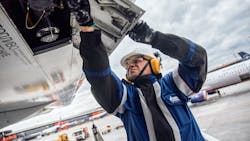Gazprom Neft Launches Sustainable Aviation Fuel Alliance with Industry Leaders
Gazprom Neft has launched an alliance with aviation industry leaders to help ensure the use of sustainable aviation fuel (SAF) at Russian airports in accordance with international standards.
The Eurasian SAF Alliance is the first Russian sustainable aviation fuel manufacturers and developers association and plans to carry out the first flight on biofuel no later than 2024.
Gazprom Neft has teamed up with Airbus and Aeroflot, as well as S7 Group and Volga-Dnepr airlines, the National Research Center named after N. Ye. Zhukovsky and the State Research Institute of Civil Aviation to form the Eurasian SAF Alliance.
Experimental batches of SAF will be produced at Gazprom Neft refineries in Moscow and Omsk and the key research will be carried out by the Gazprom Neft Industrial Innovation Technology Center in St. Petersburg with the aim of developing SAF as well as technology for industrial production.
Many commented on the new alliance.
Anatoly Cherner, deputy chairman of the management board, Gazprom Neft: “Decarbonization and new international environmental regulations require innovative technological solutions for the production of fuels with a low carbon footprint. Thanks to scientific expertise, large-scale modernization and refinery development, Gazprom Neft is actively developing the segment of environmentally friendly products for all types of transport. Now, together with airlines, aircraft manufacturers and scientific institutes, we are ready to start new research and develop green aviation fuel, unique for the Russian industry. The creation of the SAF alliance will bring together the expertise of all the participants of the air transportation market to make the process of Russian aviation biofuel development more efficient."
Andrey Chikhanchin, deputy general director for commerce and finance, Aeroflot: “Environmental friendliness is becoming one of the most important topics in aviation. Aeroflot Group has already made a significant contribution to improving environmental efficiency reducing specific CO2 emissions by 30% over the past decade. Signing the declaration on the Eurasian SAF Alliance means Aeroflot is taking a step towards the future and reaffirming its commitment to the environmental priorities of the industry. The concerted efforts we make together with industry leaders will add to increasing the sustainability and gradual decarbonization of aviation.”
Julien Franyatt, head of Airbus in Russia: “Achieving zero CO2 emissions and contributing to climate change mitigation requires the efforts of all industry players. Today, together with other aviation industry leaders, we have taken the first step towards greener aviation in Russia. As part of this alliance, we will combine our expertise to accelerate the sustainable aviation fuel certification process and promote its development in Russia. All Airbus passenger aircraft are already certified to fly with 50% sustainable fuel blends and we are researching certification for 100% use. We will be glad to share our knowledge with the Alliance partners."
Denis Fisenko, CEO of AirBridgeCargo airline (Volga-Dnepr Group): "Volga-Dnepr Group is one of the largest players in the air cargo transportation market. We are already doing a lot to reduce the negative impact on the environment through implementing initiatives on fuel efficiency, the use of a modern aircraft fleet with low CO2 emissions, the introduction of "green initiatives," and, most importantly, our efforts to increasing the load of every flight to ensure we deliver vital goods, not air. The creation of the Eurasian SAF Alliance in Russia is another step towards the environmental sustainability of our industry. Only through joint actions will we be able to overcome the barriers that hinder the implementation of SAF in Russia."
Olesya Mashkova, deputy general director for Economics and Finance, S7 Group: “The signing of the Declaration on the Creation of the SAF Alliance is an important step for S7 Group and a part of the airline's long-term ESG strategy. We are glad that the largest market players decided to work together and draw attention to the importance of introducing biofuels into Russian aviation."
Ivan Tarasov, acting deputy general director of the State Research Institute of Civil Aviation: “Decarbonization is one of the key trends on the global economic agenda and is currently one of the urgent problems for the international aviation industry. By creating the Eurasian SAF, the alliance members integrate the potential of scientific centers of oil and gas, aircraft manufacturing and transport industries in order to solve pressing environmental problems. The State Research Institute of Civil Aviation is committed to provide scientific and methodological support for the process of the introducing biofuels into civil aviation."
Vasily Shapkin, first deputy general director of National Research Center "Institute named after N.Ye. Zhukovsky:" “The motivation for launching SAF is pretty clear. We must join our efforts to reduce the negative impact of aviation on the environment. The role of our National Research Center in the alliance is to prove that aviation fuel with the use of plant-based raw materials will be safe for domestic aircraft. Using the available scientific and technical groundwork we hope to solve this problem by 2023."
The Eurasian SAF Alliance is an open platform that brings together aviation industry participants throughout the entire aviation green fuel production chain. The members of the alliance are going to develop a roadmap to study the operational properties of SAF, to support R&D, and to develop the standards and technical regulations for "into the wing" refueling.
